Verbs Teaching Resources
Explain verbs to your primary students with printable worksheets, digital activities, English games and more from the teachers of Teach Starter.
This collection of teaching resources is aligned to the Australian Curriculum and was designed by teachers to help you help your students learn how to identify and use this part of speech correctly, including action verbs, helping verbs, linking verbs and the different verb tenses.
Each resource in this collection was carefully curated by our expert teacher team to ensure it's classroom-ready, saving you time on your lesson plans!
New to teaching this part of the English curriculum or just looking for new ways to engage students as they learn about verbs? Take a peek at this primer from our teacher team!
What Is a Verb? A Kid-Friendly Definition
We know it's a bit obvious, but knowing the definition of this part of speech is only part of the battle. You'll also need to explain verbs to your students!
Try this verb definition for kids in your classroom:
Verbs are words that describe actions or states of being. They can be used to describe what a person, animal or thing is doing or what they did.
For example, 'run,' 'jump,' 'sing' and 'sleep' are all verbs.
What Are Verb Tenses?
Different verbs can be used to indicate the time when an action occurred. They do this by something called tense. Verb tense refers to when the action or state of being expressed by a verb takes place.
In the English language, there are three main verb tenses — the past, the present and the future.
Past Tense
The past tense refers to actions or events that have already happened.
Past tense verbs are created by adding '-ed' to the base form of regular verbs or by using the unique form of irregular verbs.
For example, 'walk' becomes 'walked' in the past tense, while 'go' becomes 'went.'
Present Tense
The term present tense refers to actions or events that are happening now or that happen regularly. It is the base form of the verb, without any additional endings or changes.
For example, 'walk' is the present tense form of the verb, as in 'I walk to school every day.'
Types of Verbs
Now that we have the meaning and tenses covered, what about all the types of verbs that our students encounter as they read in the classroom and (hopefully!) at home? There are six main types of verbs likely to come up in your classroom at some point:
Action Verbs
Action verbs are verbs that show an action or a movement. Words like 'run,' 'jump,' 'dance' or 'sing' all fit the bill.
Action verbs can be used in present, past or future tenses.
Helping Verbs
Helping verbs help (!) to form verb phrases. They are also known as auxiliary verbs.
Examples of helping verbs that your students will regularly encounter in their reading and use in their writing include:
- am
- is
- are
- was
- were
- has
- have
- had
- do
- does
- did
- can
- could
- may
- might
- will
- would
- shall
- should
Linking Verbs
Linking verbs link the subject of a sentence to a word or phrase that describes or identifies it. These verbs do not show action, so they can be a bit tricky for students to identify.
Examples of linking verbs include:
- is
- be
- am
- was
- were
- seem
- become
Modal Verbs
Modal verbs are helping verbs that express the speaker's attitude towards the action or state of being expressed by the main verb. These are also tricky for younger writers to wrap their heads around as they express hypotheticals rather than specific actions.
Modal verb examples include words such as:
- can
- could
- may
- might
- should
- must
- shall
- will
- would
Regular Verbs
Regular verbs follow a predictable pattern when forming their past tense and past participle forms. To make them, you just add '-ed' to the base form of the verb!
For example, 'walk' becomes 'walked,' 'play' becomes 'played,' and 'talk' becomes 'talked.'
Irregular Verbs
Irregular verbs are more challenging for young spellers because they don't follow the predictable pattern of adding '-ed' to form their past tense and past participle forms. They have unique forms for each tense.
Some examples of irregular verbs are:
- Eat/ate
- Go/went
- Write/write
- Catch/caught
How to Teach Verbs to Kids — Fun Verb Activities
When you first begin introducing verbs to your students, they'll learn to identify and use verbs in sentences and understand the concepts of past, present, and future tense. Students will learn more complex verb forms and tenses as they progress through primary school and beyond.
Looking for a few ways to make this fun and engaging? This teaching resource collection is chock full of fun reading rotation activities, engaging printables and more ideas from our teacher team.
You might also want to try these ideas and activities:
- Action Charades — For kindergartners who are just learning about action words, action charades can be a lot of fun for the whole class. Act out words they've learned and have your students guess them. It's simple, fun and engaging! You can also flip this activity on its head by having students act out the verbs themselves.
- Picture It — Provide a picture prompt, and ask your year 1 students to create a story about what is going on in the picture using verbs in the proper context. For students who need extra support, you can provide sentence starters.
- Show It — Make show and tell a verb activity! Have students bring special items to class to show off to their classmates, and encourage them to share details about it using verbs.
How to Teach Verb Tenses
Do your students already have the basics of this part of speech down? It's time to turn to verb tenses.
Teaching verb tenses can be a bit more complex than teaching verbs themselves, but there are a few strategies that can be effective:
- Verb Tense Stacking Block Game — Label wood blocks with action verbs and have students play a stacking tower game in small groups, carefully removing one block at a time to prevent the tower from falling. Each time they remove a block, the student will have to write down the past, future and present tense of the verb on their block.
- Verb Tense Timeline — Provide a timeline of events your class is studying in HASS. Challenge students to write sentences using verbs in different tenses to describe events that occurred in the past, are happening now, or will happen in the future. For kids who need extra support, provide visual or written cues to help them identify the different tenses.
- Plus Plan
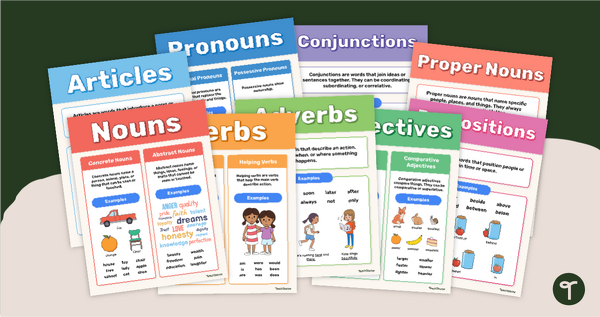
Nouns, Proper Nouns, Verbs, Adjectives, Adverbs and Conjunctions Posters
Enhance student understanding of the 8 parts of speech with these colourful, informative and easily-referenced grammar wall posters.
- Free Plan
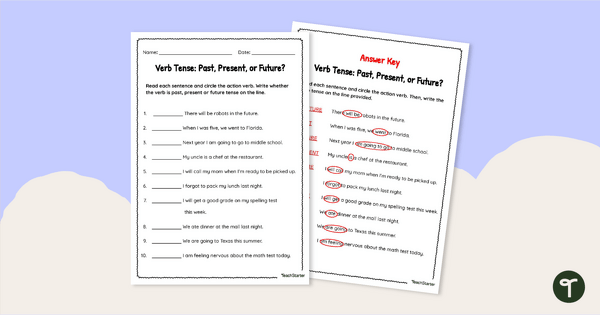
Verb Tense Worksheet
Provide students with additional verb tense practice with a past, present, and future tense worksheet.
- Free Plan
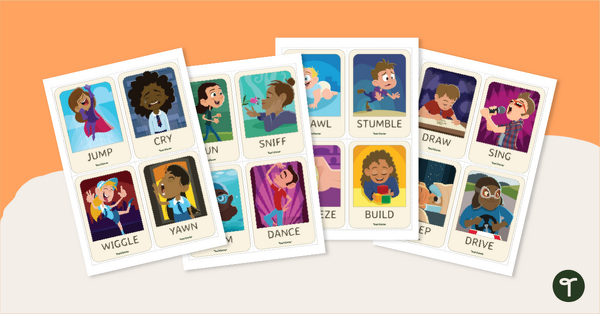
Verb Charades Active Game
Practise action verbs with this fun active charades game!
- Plus Plan
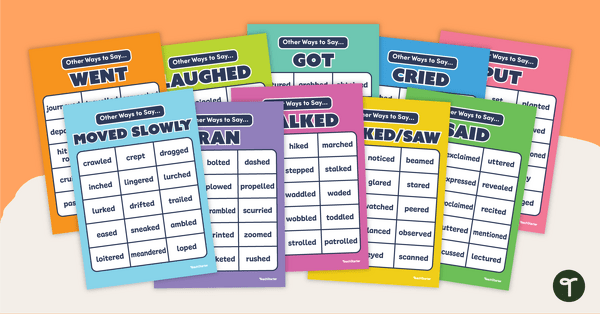
Vivid Verbs Poster Pack
Teach your students to omit boring, overused verbs from their writing with a classroom set of vivid verb posters.
- Plus Plan
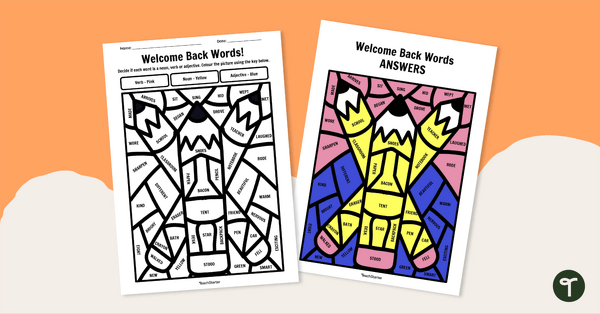
Parts of Speech Colouring Activity - Back to School
Use this Parts of Speech Colouring Activity as a back to school review activity with your students.
- Free Plan
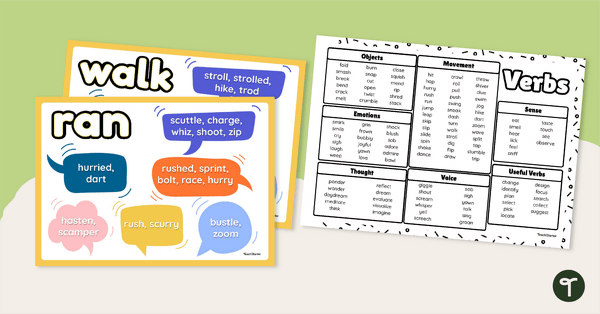
Better Verb Choice Words Pack
Help your students during their writing with this set of visually appealing verb posters and verb word mat.
- Plus Plan
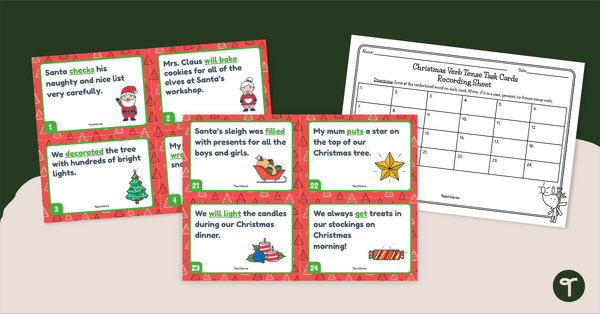
Christmas Task Cards - Past, Present and Future Tense Practise
Practise identifying past, present, and future tense verbs with a set of Christmas Verb Tense Task Cards!
- Free Plan
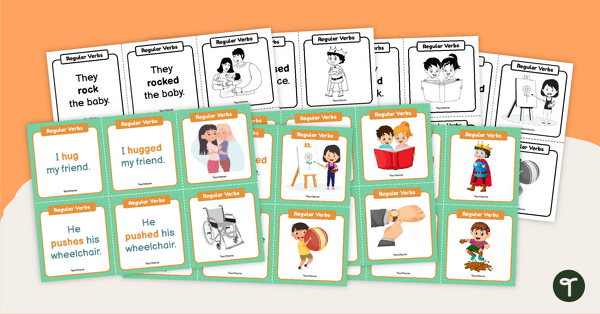
Present and Past Tense Regular Verbs Matchup Cards
Learn about simple present tense and simple past tense of regular verbs with this match up activity.
- Plus Plan
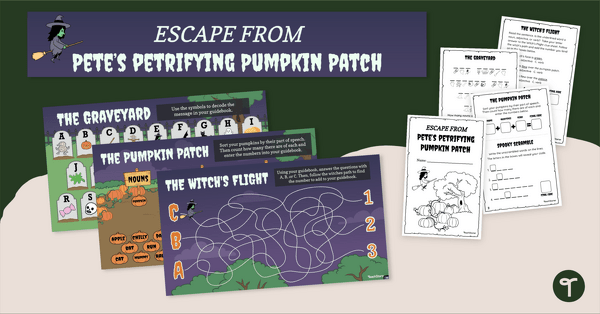
Escape from Pete's Pumpkin Patch - Halloween Escape Room
Escape the evil witch who turns children into pumpkins at Pete’s Pumpkin Patch using inferencing, problem solving, and grammar skills.
- Free Plan
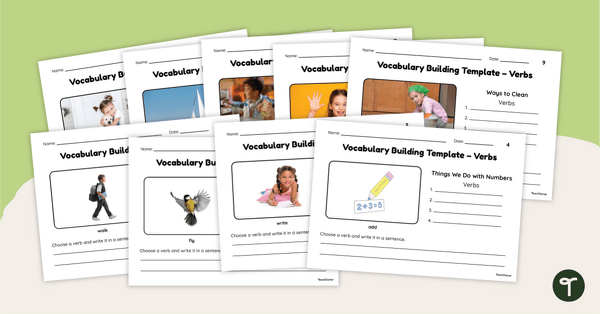
Vocabulary Building Template – Verbs
Expand verb vocabulary with this open-ended task.
- Plus Plan
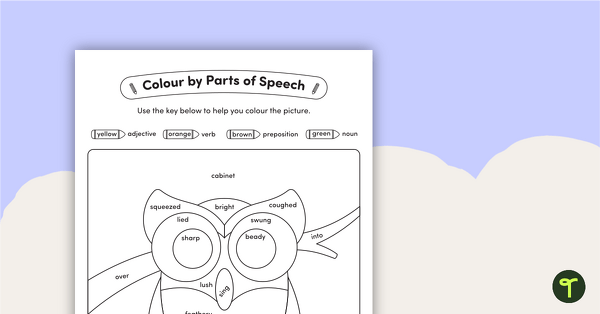
Colour by Parts of Speech - Nouns, Verbs, Adjectives and Prepositions - Owl
Consolidate parts of speech by colouring nouns, verbs, adjectives and prepositions on the owl.
- Free Plan
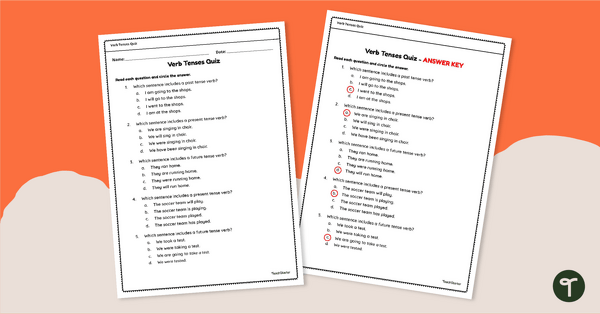
Verb Tenses Quiz Worksheet
Assess your students' knowledge of verb tenses with this 5-question quiz.
- Plus Plan
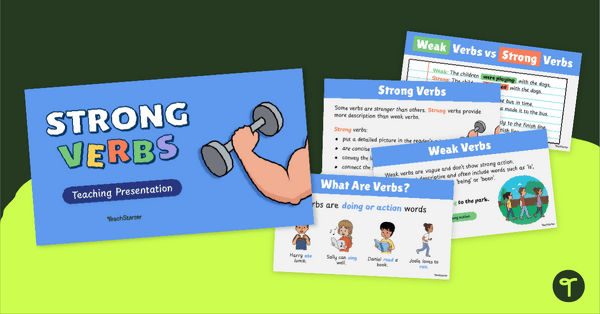
Strong Verbs Teaching Slides
Discover how to use strong verbs in sentences with this set of teaching slides.
- Free Plan
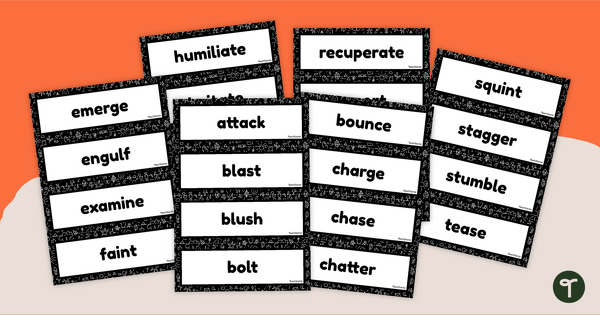
Strong Verbs Word Wall
Print a set of strong verbs word wall cards to help your students boost their writing skills!
- Plus Plan
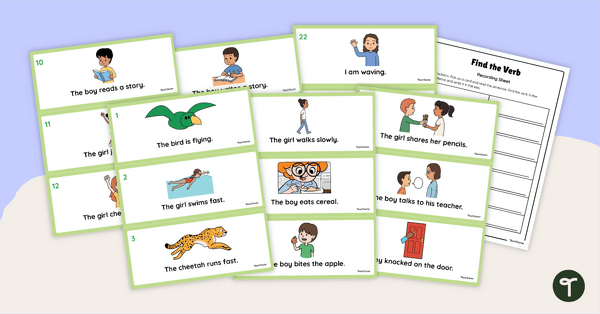
Find the Verb Task Cards
Help students recognise verbs in sentences with this set of Find the Verb task cards and recording sheet.
- Plus Plan
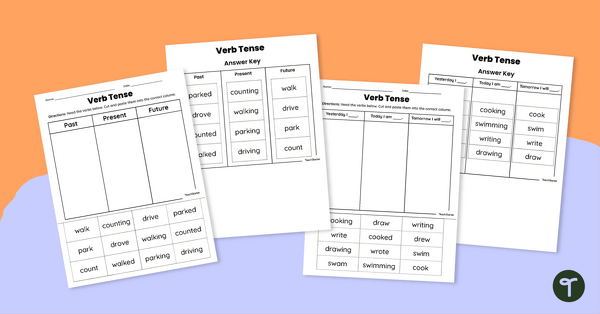
Cut and Paste Matching Verb Tense Worksheet
Practise identifying past, present and future tense in verbs using this set of cut and paste worksheets.
- Plus Plan
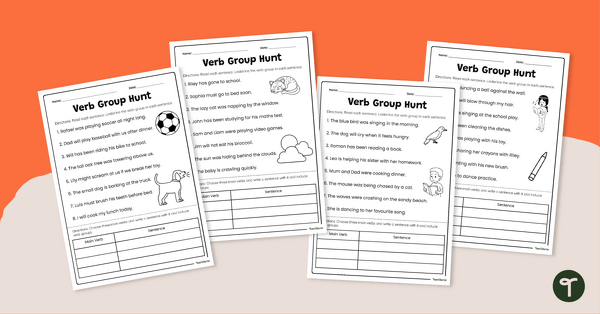
Verb Group Hunt Worksheet Pack
Explore verb groups with your students using this verb group hunt worksheet pack.
- Plus Plan
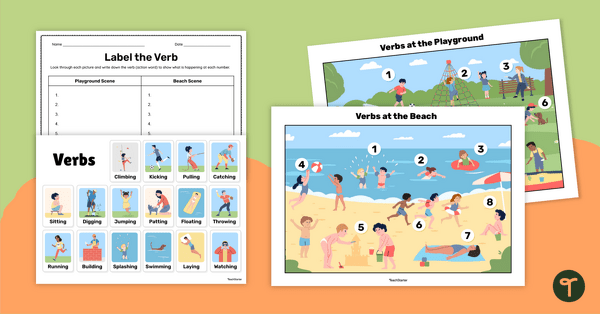
Verbs in Pictures Activity
Explore verbs in action using these scenes at the playground and beach.
- Plus Plan
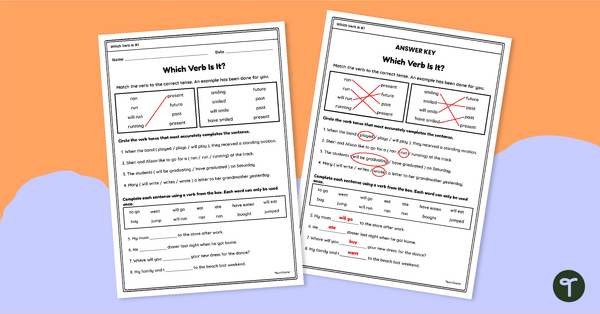
Which Verb Is It? Worksheet
Practise past, present, and future verb tenses with this easy to implement worksheet.
- Plus Plan
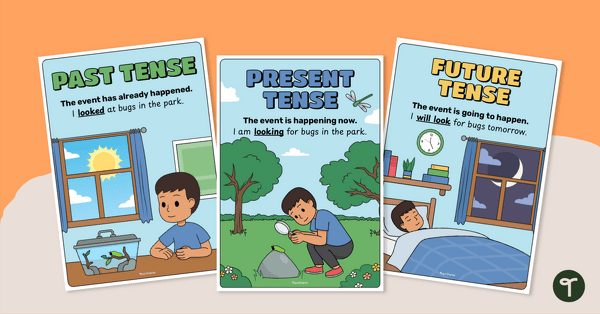
Past Tense, Present Tense and Future Tense Posters
Help your students understand verb tense with this set of past, present and future tense poster examples.
- Plus Plan
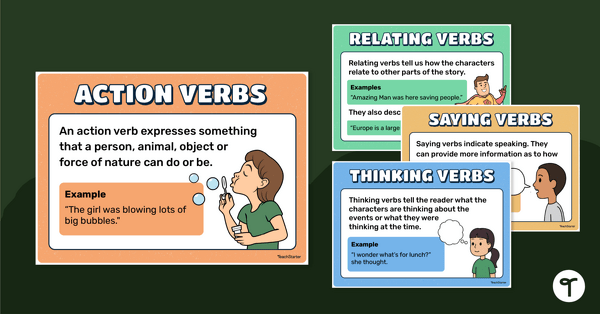
Types of Verbs Poster Set
Explore the different types of verbs with this set of verb posters displaying the definition and examples of action, saying, thinking and relating verbs.
- Plus Plan
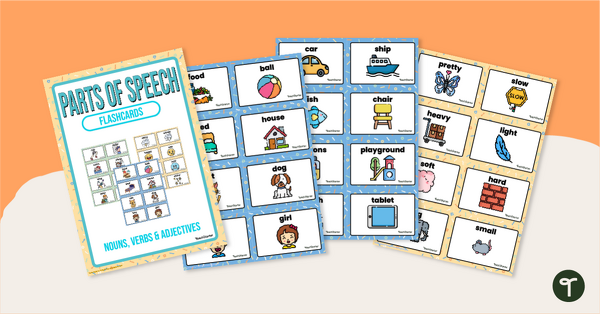
Nouns, Verbs and Adjectives Flashcards
Create a variety of grammar activities with 60 printable noun, verb and adjective flashcards.
- Plus Plan
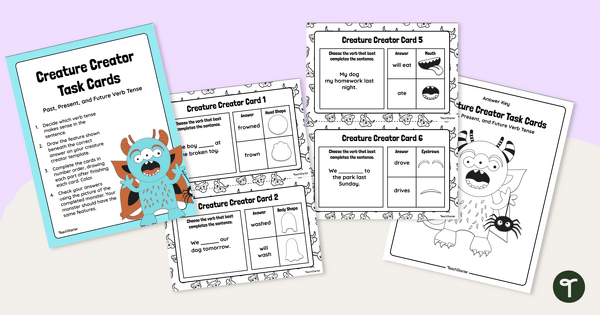
Creature Creator - Verb Tense Task Cards
Create a mystery creature using past, present and future tense verbs.
- Plus Plan
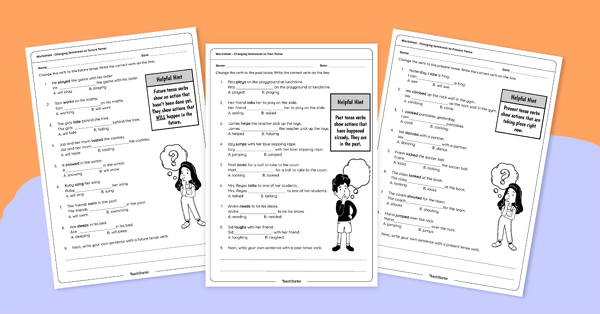
Writing Sentences in Past, Present and Future Tense Worksheets
Practise verb tense by changing sentences into past, present and future.
- Plus Plan
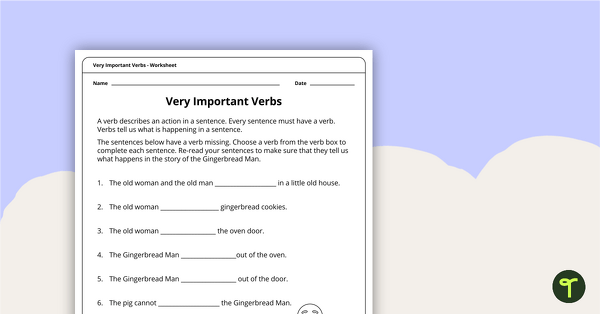
Very Important Verbs Worksheet
Explore verbs within the context of the well-known story of The Gingerbread Man.
- Plus Plan
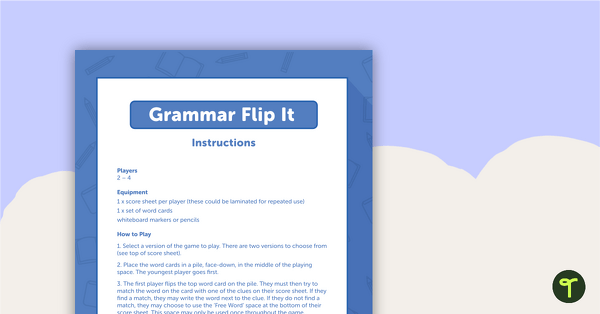
Verb Grammar Card Game – Flip It!
A fun game for students to play in small groups to consolidate their understanding of verbs.
- Plus Plan
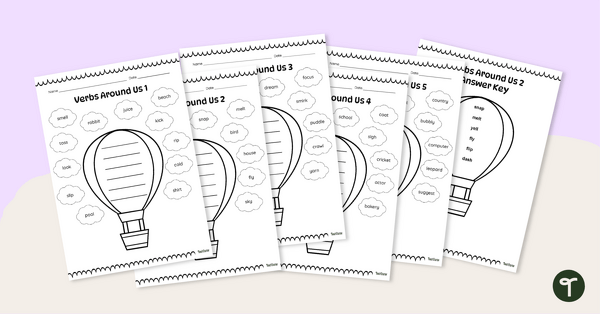
Verbs Around Us Worksheet Pack
Practise identifying verbs in a collection of words with this set of five verb worksheets.
- Plus Plan
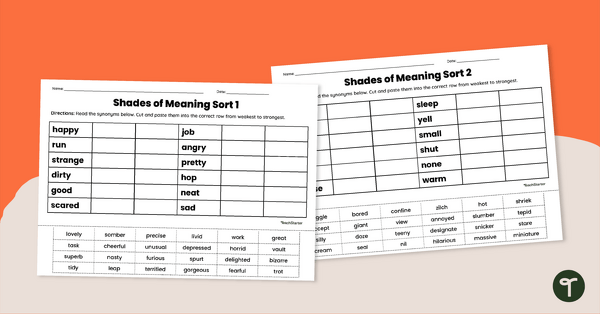
Cut and Paste Shades of Meaning Verb Sort
Engage your students in exploring subtle differences between verbs with this set of two cut and paste worksheets.
- Plus Plan
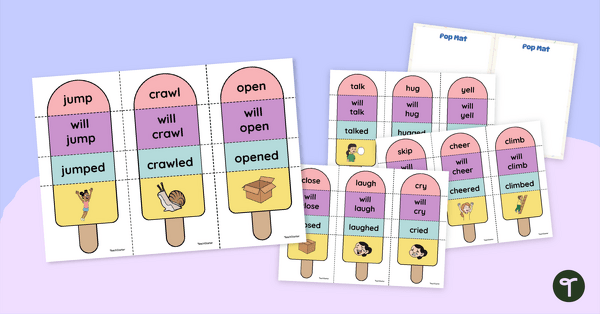
Verb Tense Puzzle Pop Activity
Grow your students' knowledge of the tense of verbs with this puzzle pop matching activity.
- Plus Plan
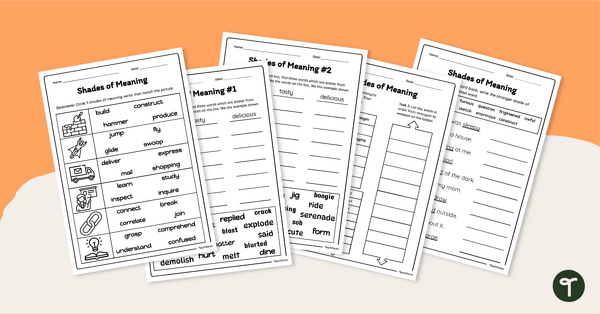
Shades of Meaning in Verbs Worksheet Pack
Help your students explore different verbs for their writing with these shades of meaning verb worksheets.
- Plus Plan
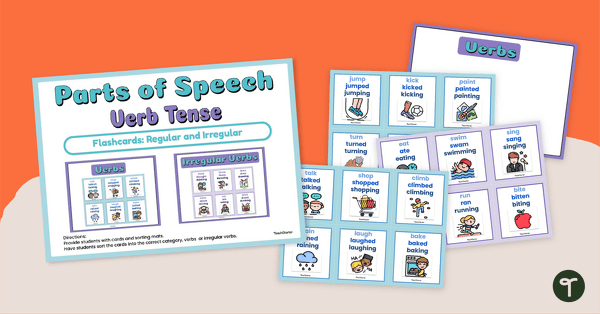
Verb Tense Regular and Irregular Sorting Activity
Help students understand the difference between a regular and irregular verb tense group with this hands-on verb sorting activity.
- Plus Plan
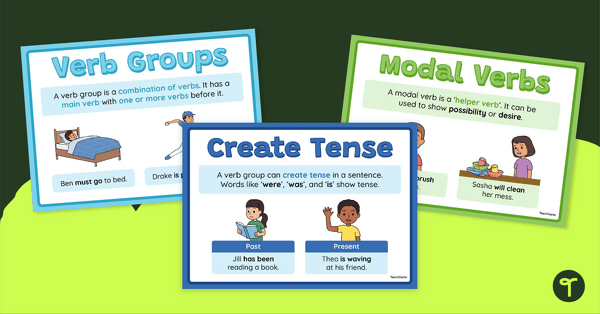
Verb Group Posters
Guide your students to be better writers with this verb group poster set to display in your classroom.